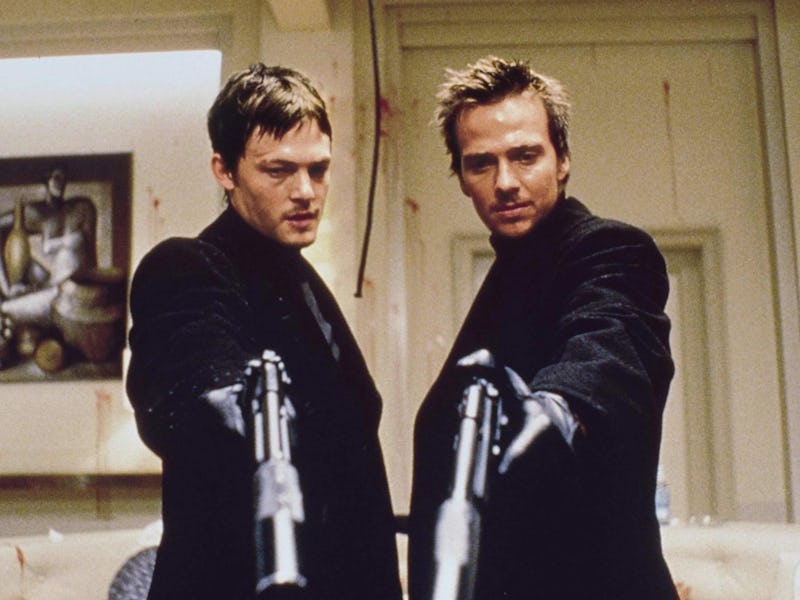How The Boondock Saints Became the Ultimate Cautionary Tale of '90s Indie Cinema
Be careful what you wish for.

For Gen-Xers of a certain age, The Boondock Saints is the epitome of cult movie trash. The 1999 vigilante action thriller is a gratuitously violent display of style over substance that exemplifies the sheer excess of the genre. A flop upon release, the movie became a big hit on home release but is largely viewed as one of the lesser examples of the decade's boom of indie cinema.
It wasn't supposed to be that way, however. This was meant to be a very big deal, the crowning achievement of the ultimate rags-to-riches story for a Hollywood outsider breaking into the mainstream. Instead, The Boondock Saints became the ultimate example of "be careful what you wish for because you just might get it."
In the mid-90s, Troy Duffy was a barman who performed occasional gigs with his band in Los Angeles. Inspired by an incident where he came home one day to find a dead woman being wheeled out of a drug dealer's apartment, he rented a computer and wrote a screenplay. He wrote a violent gangster story about two brothers who become vigilantes and decide to get rid of Boston's criminal underworld in the name of God. He wanted to "give everybody that sick fantasy" of killing off the bad guys and being cheered on for it.
The finished script found its way to a producer's assistant at New Line Cinema and was eventually passed around Hollywood. One executive who loved it was Harvey Weinstein, and the disgraced former head of Miramax won a bidding war to acquire the movie. Not only did Duffy make $450,000 for his debut script, he was given the chance to direct his first film. He even offered to buy the bar that Duffy worked at. Overnight, Duffy became a star. His story was certainly unusual but it also felt par for the course in the '90s. Indie cinema had taken over and become cool, as well as a safe commercial bet. Directors like Quentin Tarantino, Richard Linklater, and Kevin Smith had become icons of the era with self-referential and scrappy, but skilled, movies and had gained reputations as nerds who broke into the mainstream by blazing their own trails. A lot of people were on the lookout for the next Tarantino, so it wasn’t tough to see how a script like The Boondock Saints would inspire such enthusiasm.
Things fell apart very quickly after that.
Troy Duffy at a premiere for The Boondock Saints.
Duffy's ego quickly grew out of control. Duffy and Miramax fought over casting choices. He insulted actors who were up for roles in the movie. At one point, he called Kenneth Branagh, who was in consideration for the lead role, a "c**t" (that part eventually went to Willem Dafoe). He got into a heated argument with Ewan McGregor over the death penalty. Duffy repeatedly disparaged everyone, friend or foe alike, and threatened to leave his agency when the film didn't go into production quickly enough. Eventually, Miramax put the film in turnaround — essentially the permanent backburner — and Duffy became convinced that Weinstein had blacklisted him from the film industry.
In 1998, he was eventually able to get the financing to make the movie through Franchise Pictures, albeit at half the budget Miramax had offered. He took it to the 1999 Cannes Film Festival in the hopes of finding distribution, but no major American company made an offer. It eventually received a very limited release but was pulled from theaters quickly and then given a VHS/DVD release. Although the film became a sleeper hit on home video, Duffy didn't see a penny from those sales.
He never became a big director either. While he did direct a sequel to The Boondock Saints, subtitled All Saints Day, its reviews were even weaker than its predecessor. Duffy has spent over a decade talking about plans to make a third movie, but when it was announced in March 2024 that there would be a "reimagining" of the franchise featuring the original actors, Norman Reedus and Sean Patrick Flannery, Duffy was not attached as a director. Duffy's most recent credit was as a co-writer on the 2020 comedy Guest House, starring Pauly Shore.
Troy Duffy expected The Boondock Saints to be his key to success. It was not.
And all of this was caught on camera. Duffy asked two of his friends, Tony Montana and Mark Brian Smith, to document his glorious Hollywood rise for a documentary. Overnight, released in 2003, covers every excruciating detail as Duffy goes from star to nobody. It's a fascinating but uncomfortable movie to watch as you see Duffy alienate everyone around him, drink too much, make cruel comments to colleagues, and just generally be a bully. Frankly, you come out of watching Overnight glad that he didn't become the next Tarantino. Duffy called Overnight "an 82-minute smear campaign" and maintains that the film was edited unfairly to make him appear like a "boorish asshole."
Watching The Boondock Saints, it’s tough to imagine this ever being seen as comparable to Pulp Fiction. It’s shallow and messy and its deification of vigilante justice is, at best, questionable. As an example of big dumb fun, it works best if you have that nostalgic attachment to it. Maybe it could have been a big hit in that period of the late ‘90s when every studio had a Tarantino knock-off, but, to put it bluntly, Overnight is far more interesting than the movie whose production it documents. Troy Duffy’s story is the moral to be learned, the cautionary tale that warns up-and-comers to never let their head get bigger than their talent.